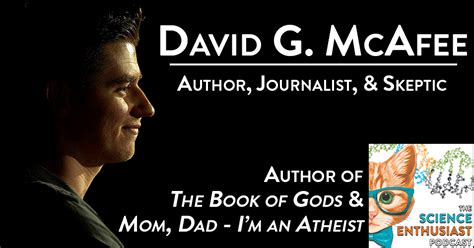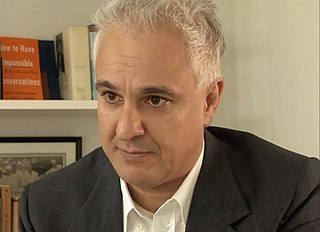A Quote by David G. McAfee
I don’t claim to know an over-arching ‘Meaning of Life,’ but I do operate under the understanding that life should not be lived under the pretense that it is simply a test propagated by an invisible, intangible, Creator-God. And it should not be spent identifying with religious traditions and organized groups that, historically, have been at the root of a tremendous amount of oppression and violence.
Quote Topics
Amount
Been
Claim
Creator
God
Groups
Historically
Identifying
Intangible
Invisible
Know
Life
Lived
Meaning
Meaning Of
Meaning Of Life
Operate
Oppression
Organized
Over
Pretense
Religious
Religious Traditions
Root
Should
Simply
Spent
Test
Traditions
Tremendous
Tremendous Amount
Understanding
Violence
Related Quotes
Is a Christian- one who communicates daily with the Creator- to divorce himself from the things God created and intended man to have, and which demonstrate the fact that man has been made in the image of God? In other words, are we who have been made in the image of our creator to be less creative than those who do not know the Creator? The Christian should have more vividly expressed creativity in his daily life.
"Oppression" or "systems of oppression" operate as a shorthand terms in much writing and speaking so that we do not have to list all these systems of meaning and control each time (i.e. racism, ableism, xenophobia, etc.). I needed a term like that, but "oppression" implies a kind of top-down understanding of power that is at odds with the Foucaultian model I rely on in my work.
A Christian, who realizes he has been made in the image of the Creator God and is therefore meant to be creative on a finite level, should certainly have more understanding of his responsibility to treat God's creation with sensitivity, and should develop his talents to do something to beautify his little spot on the earth's surface.
The ultimate test of my understanding of the scriptural teaching is the amount of time I spend in prayer. As theology is ultimately the knowledge of God, the more theology I know, the more it should drive me to seek to know God. Not to know about Him but to know Him! The whole object of salvation is to bring me to knowledge of God. If all my knowledge does not lead me to prayer there is something wrong somewhere.
If you are posing as religious and are not living the life as stressed by God, you should wake up. It is wrong to be insincere. The best time to begin a religious life is when you are youthful and well. If you have a short time to live, you must work harder at it. And if you have along time to live, you should not waste that precious opportunity.
They say that art should stand the test of time. Life lasts a limited amount of time. Mountains and trees and earth will outlive human beings, but we don't know if they will be here always. Art does outlast the life span of its maker. Art should communicate to an increasing circle of strangers-people who do not know the artist, but come to know the work, and through the work, come to know something about the humanity of the artist that rings with their own humanity.
And I learned what is obvious to a child. That life is simply a collection of little lives, each lived one day at a time. That each day should be spent finding beauty in flowers and poetry and talking to animals. That a day spent with dreaming and sunsets and refreshing breezes cannot be bettered. But most of all, I learned that life is about sitting on benches next to ancient creeks with my hand on her knee and sometimes, on good days, for falling in love.
What's very interesting about the violence in Lebanon and the violence in Iraq and the violence in Gaza is this: These are all groups of terrorists who are trying to stop the advance of democracy. They're trying to thwart the will of millions who simply want a normal, hopeful life. That's what we're seeing.
It's always been you know, religion that has been the primary impediment to actual relationship with God, because it creates a mythology about performance -- that you can perform your way into the appeasement of the deity. And you know, when you're born inside the cultural framework that I was, and you're born inside the religious traditions that I was, that becomes your understanding of spirituality: That it's about trying to please God. So, it's really not about God at all; it's about our ability to perform according to whatever the expectations are.
What do I know about God and the purpose of life? I know that this world exists. That I am placed in it like my eye in its visual field. That something about it is problematic, which we call its meaning. This meaning does not lie in it but outside of it. That life is the world. That my will penetrates the world. That my will is good or evil. Therefore that good and evil are somehow connected with the meaning of the world.The meaning of life, i.e. the meaning of the world, we can call God. And connect with this the comparison of God to a father.

































